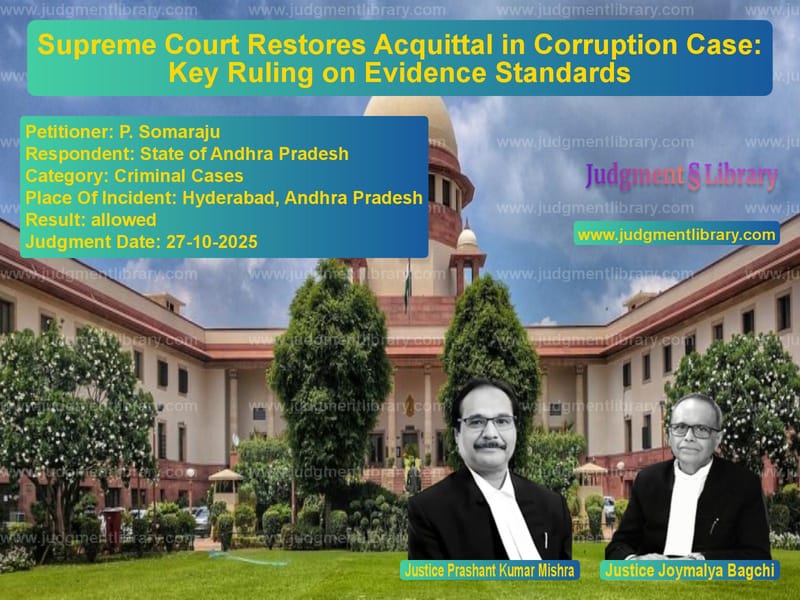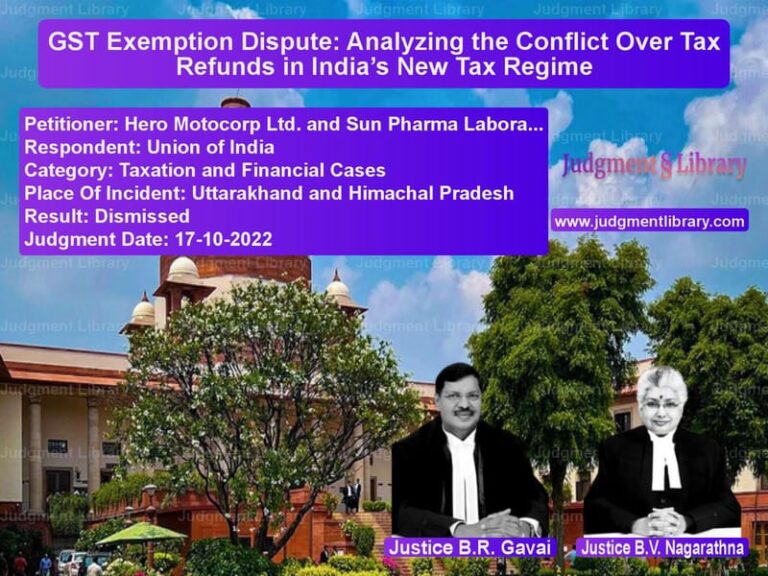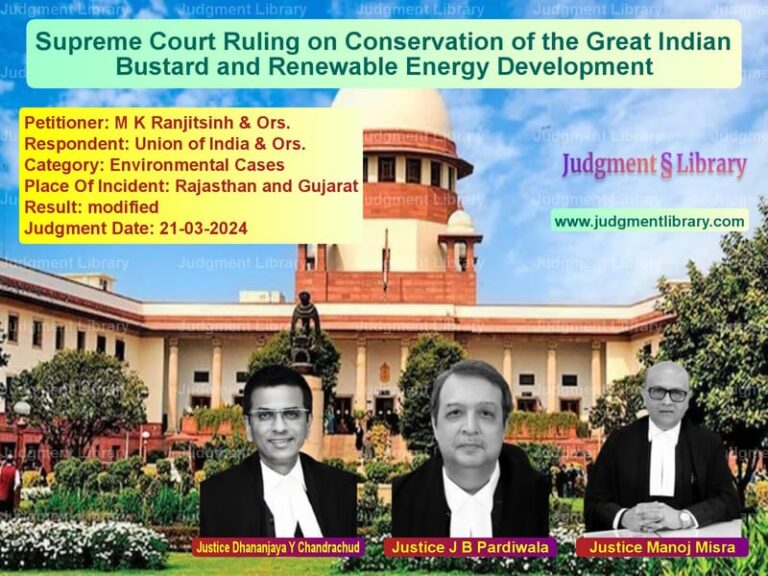Supreme Court Restores Acquittal in Corruption Case: Key Ruling on Evidence Standards
In a significant judgment that reinforces the high standards of proof required in corruption cases, the Supreme Court of India has restored the acquittal of a government official accused of accepting bribes. The case involved P. Somaraju, an Assistant Commissioner of Labour in Hyderabad, who was accused of demanding and accepting ₹3,000 as bribe for renewing labor contractor licenses in 1997. The legal journey spanned nearly three decades, moving from acquittal by the Trial Court to conviction by the High Court, and finally back to acquittal by the Supreme Court.
The Supreme Court’s ruling provides crucial clarity on the principles governing appeals against acquittals and the evidence required to prove corruption charges beyond reasonable doubt. The judgment emphasizes that while appellate courts have the power to review evidence in appeals against acquittals, this power must be exercised with restraint, especially when the Trial Court’s view is reasonable and supported by evidence.
The Case Background
The case originated in 1997 when S. Venkat Reddy, a licensed labor contractor, approached the Anti-Corruption Bureau with a complaint against P. Somaraju. The complainant alleged that the appellant had demanded ₹9,000 as bribe for renewing three labor contractor licenses. According to the prosecution, a partial payment of ₹3,000 was made on September 25, 1997, and the remaining amount was to be paid later. The ACB organized a trap operation on September 26, 1997, where the complainant allegedly handed over ₹3,000 to the appellant, which was recovered from his table drawer.
The Trial Court acquitted the appellant in 2003, finding that the prosecution had failed to prove the demand and acceptance of bribe beyond reasonable doubt. However, the High Court reversed this acquittal in 2011 and convicted the appellant, leading to the appeal before the Supreme Court.
Supreme Court’s Legal Analysis
The Supreme Court began its analysis by reiterating the well-settled principles governing interference with acquittals, quoting extensively from the landmark case of Chandrappa & Ors. vs. State of Karnataka. The Court emphasized that “An appellate court has full power to review, reappreciate and reconsider the evidence upon which the order of acquittal is founded.” However, the Court also highlighted the limitations, stating that “If two reasonable conclusions are possible on the basis of the evidence on record, the appellate court should not disturb the finding of acquittal recorded by the trial court.”
The Court further elaborated that “due to the reinforced or ‘double’ presumption of innocence after acquittal, interference must be limited. Judicial intervention is only warranted where the Trial Court’s view is perverse, based on misreading or ignoring material evidence, or results in manifest miscarriage of justice.”
Critical Evaluation of Evidence
The Supreme Court conducted a meticulous examination of the evidence and found several serious infirmities in the prosecution’s case. The Court noted that the Trial Court had acquitted the appellant based on multiple valid grounds, including material inconsistencies in the complaint and testimony of witnesses.
One crucial finding was that “the complainant has no proof other than his own oral statement that he visited the appellant on 25.09.1997, wherein the appellant allegedly made his first demand for a bribe.” The Court also highlighted the significant discrepancy regarding when the complaint was written, noting that “the complainant claims it was drafted on the morning of 25.09.1997. Yet, the alleged demand is said to have occurred in the evening of that very day.”
The Supreme Court was particularly troubled by the complainant’s conduct during the trap operation. The Court observed that “the complainant’s conduct in directing Rajender, the mediator and accompanying independent witness, to remain outside the appellant’s office during the crucial half-hour in which the alleged demand and acceptance occurred. This was contrary to the explicit instructions of the DSP.” This meant that the only independent witness who could have corroborated the demand and acceptance was deliberately kept out of the room.
Hand-Wash Test and Recovery of Money
The Supreme Court criticized the High Court’s approach to the negative hand-wash test. The High Court had speculated that “some public servants adopt several methods of collection of bribe amount instead of receiving the bribe amount with their hands and keeping the same in their pockets.” However, the Supreme Court found this reasoning problematic, stating that “We take this opportunity to reiterate that suspicion, however strong, cannot take the place of proof.”
The Court emphasized the fundamental legal principle that “For an offence under Section 7 of PC Act, the demand of illegal gratification is a sine qua non to prove the guilt. Mere recovery of currency notes cannot constitute an offence under Section 7 of PC Act, unless it is proved beyond reasonable doubt that accused voluntarily accepted the money, knowing it to be a bribe.”
Defense Evidence and Witness Credibility
The Supreme Court gave significant weight to the defense evidence, which provided an alternative explanation for how the money ended up in the appellant’s drawer. The defense witnesses, S. Ramulu Naik (DW-1) and Y. Veeranna Babu (DW-2), testified that the appellant had briefly left his office to use the bathroom, and during this absence, the complainant entered the chamber alone.
The Court found that “Both DWs support the defense version… Their testimony cannot be brushed aside as manufactured. It directly supports the appellant’s explanation that the complainant took advantage of his brief absence to place the tainted notes in the drawer without any demand or acceptance by the appellant.”
The Supreme Court rejected the High Court’s reasoning for discarding this evidence, stating that “A witness’s evidence is not to be rejected merely because he appeared before or dealt with the accused in an official or professional capacity, particularly when it was in course of their business that they visited the spot i.e., they are ‘natural’ witnesses.”
Procedural Lapses and Investigation Flaws
The judgment highlighted several serious procedural lapses in the investigation. The Court noted that “Both, the DSP and the Inspector of ACB, admit they did not question the complainant on this point, and till date no explanation has ever been offered for keeping Rajender out of the room. They also admit that they did not question any of the other office staff or visitors.”
Furthermore, “the other mediator Balaji was not examined by the prosecution at all. These circumstances are nowhere addressed by the High Court. Such omissions cannot be brushed aside lightly, as they strike at the root of the prosecution version and cast serious doubt on whether demand and acceptance were proved beyond reasonable doubt.”
Legal Requirements for Corruption Charges
The Supreme Court reiterated the essential legal requirements for proving corruption charges, quoting from Rajesh Gupta vs. State through Central Bureau of Investigation: “The law is well-settled by the judgments of this Court… whereby it has been clarified that the sole testimony of the complainant, who is the interested witness, cannot be relied upon without having corroboration with the independent evidence.”
The Court emphasized that “The statutory presumption under Section 20 of the PC Act is not automatic and arises only once the foundational facts of demand and acceptance are proved.” In this case, the prosecution failed to establish these foundational facts beyond reasonable doubt.
Restoration of Acquittal
In its concluding remarks, the Supreme Court held that “the Trial Court’s view was both reasonable and firmly rooted in the evidence on record. The acquittal was based on careful evaluation of this evidence, including the above-discussed material contradictions, unreliable testimonies, and serious procedural lapses, and cannot be termed perverse or unsustainable.”
The Court found that “The High Court, on the other hand, did not demonstrate any compelling reason to depart from that view. It failed to engage with the Trial Court’s detailed reasoning and instead substituted its own inferences without addressing the evidentiary gaps identified above.”
The Supreme Court powerfully concluded that “The strength of the criminal process lies in restraint as much as in scrutiny. The appellant’s acquittal, having stood on reasonable grounds, deserves to stand restored.”
Broader Implications
This judgment serves as an important reminder of the high standards of proof required in criminal cases, particularly those under the Prevention of Corruption Act. The Supreme Court’s meticulous approach to evaluating evidence, especially regarding trap cases, provides valuable guidance for lower courts. The ruling reinforces that mere recovery of money, without clear evidence of demand and voluntary acceptance, is insufficient to establish guilt in corruption cases.
The judgment also underscores the importance of proper investigation procedures and the need for independent corroboration of the complainant’s version. By restoring the acquittal, the Supreme Court has reaffirmed the fundamental principle that in criminal jurisprudence, it is better that ten guilty persons escape than that one innocent suffer.
Petitioner Name: P. Somaraju.Respondent Name: State of Andhra Pradesh.Judgment By: Justice Prashant Kumar Mishra, Justice Joymalya Bagchi.Place Of Incident: Hyderabad, Andhra Pradesh.Judgment Date: 27-10-2025.Result: allowed.
Don’t miss out on the full details! Download the complete judgment in PDF format below and gain valuable insights instantly!
Download Judgment: p.-somaraju-vs-state-of-andhra-prad-supreme-court-of-india-judgment-dated-27-10-2025.pdf
Directly Download Judgment: Directly download this Judgment
See all petitions in Bail and Anticipatory Bail
See all petitions in Fraud and Forgery
See all petitions in Custodial Deaths and Police Misconduct
See all petitions in Extortion and Blackmail
See all petitions in Money Laundering Cases
See all petitions in Judgment by Prashant Kumar Mishra
See all petitions in Judgment by Joymalya Bagchi
See all petitions in allowed
See all petitions in supreme court of India judgments October 2025
See all petitions in 2025 judgments
See all posts in Criminal Cases Category
See all allowed petitions in Criminal Cases Category
See all Dismissed petitions in Criminal Cases Category
See all partially allowed petitions in Criminal Cases Category







